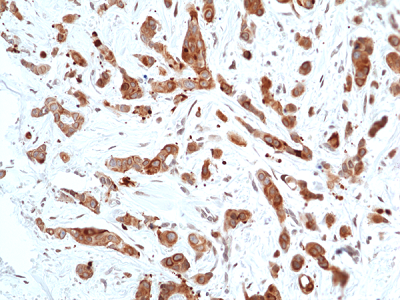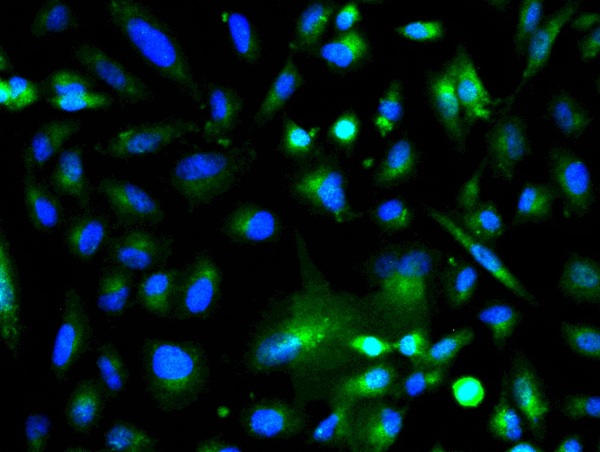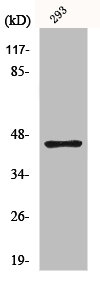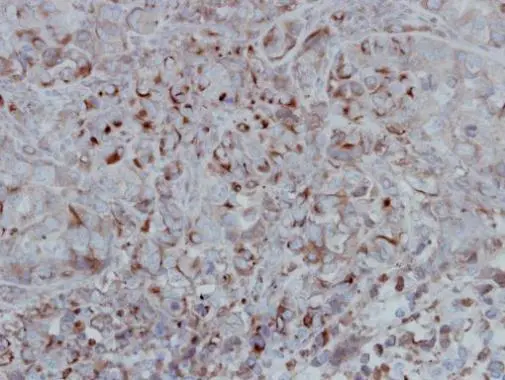
anti-Phospho-GSK-3beta (Ser9), Rabbit Monoclonal (RM453)
REV-31-1345-00
ApplicationsWestern Blot, ImmunoHistoChemistry
Product group Antibodies
ReactivityHuman
TargetGSK3B
Overview
- SupplierRevMAb Biosciences
- Product Nameanti-Phospho-GSK-3beta (Ser9), Rabbit Monoclonal (RM453)
- Delivery Days Customer10
- ApplicationsWestern Blot, ImmunoHistoChemistry
- CertificationResearch Use Only
- ClonalityMonoclonal
- Clone IDRM453
- Gene ID2932
- Target nameGSK3B
- Target descriptionglycogen synthase kinase 3 beta
- Target synonymsglycogen synthase kinase-3 beta, GSK-3 beta, serine/threonine-protein kinase GSK3B
- HostRabbit
- IsotypeIgG
- Protein IDP49841
- Protein NameGlycogen synthase kinase-3 beta
- Scientific DescriptionGlycogen synthase kinase-3 (GSK3) is a protein kinase that was originally identified as a regulator of glycogen synthase, a key enzyme in glycogen metabolism. Since then, it has been shown to be involved in the regulation of a diverse array of cellular functions, including protein synthesis, cell proliferation, cell differentiation, microtubule assembly/disassembly and apoptosis. GSK3s substrate specificity is unique in that phosphorylation of the substrate only occurs if a phosphoserine or phosphotyrosine is present - four residues C-terminal to the site of GSK phosphorylation. There exist two isoforms of GSK3, GSK3-alpha and GSK3-beta, and they are strictly regulated via phosphorylation. Phosphorylation of GSK3-beta on Ser9 (Ser21 in GSK3-alpha) by protein kinase B (PKB) causes its inactivation and is the primary mechanism responsible for growth factor inhibition of this kinase. Activation of GSK3-beta is dependent upon the phosphorylation of Tyr216 (Tyr279 in GSK3-alpha). Upon activation, it has been shown to phosphorylate a number of different cellular proteins, including p53, c-Myc, c-Jun, heat shock factor-1 (HSF-1) and cyclin D1. GSK3-beta also has been shown to phosphorylate aberrant sites on the microtubule associated protein tau, which is critical for the progression of Alzheimers disease. - Recombinant Antibody. This antibody reacts to human GSK-3beta only when phosphorylated at Ser9. There is no cross-reactivity to GSK-3beta that is not phosphorylated. This antibody may also react to mouse or rat Phospho- GSK-3beta (Ser9) as predicted by immunogen homology. Applications: IHC, WB. Clone: RM453. Isotype: Rabbit IgG. Formulation: Liquid. 50% Glycerol/PBS with 1% BSA and 0.09% sodium azide. Glycogen synthase kinase-3 (GSK3) is a protein kinase that was originally identified as a regulator of glycogen synthase, a key enzyme in glycogen metabolism. Since then, it has been shown to be involved in the regulation of a diverse array of cellular functions, including protein synthesis, cell proliferation, cell differentiation, microtubule assembly/disassembly and apoptosis. GSK3s substrate specificity is unique in that phosphorylation of the substrate only occurs if a phosphoserine or phosphotyrosine is present - four residues C-terminal to the site of GSK phosphorylation. There exist two isoforms of GSK3, GSK3-alpha and GSK3-beta, and they are strictly regulated via phosphorylation. Phosphorylation of GSK3-beta on Ser9 (Ser21 in GSK3-alpha) by protein kinase B (PKB) causes its inactivation and is the primary mechanism responsible for growth factor inhibition of this kinase. Activation of GSK3-beta is dependent upon the phosphorylation of Tyr216 (Tyr279 in GSK3-alpha). Upon activation, it has been shown to phosphorylate a number of different cellular proteins, including p53, c-Myc, c-Jun, heat shock factor-1 (HSF-1) and cyclin D1. GSK3-beta also has been shown to phosphorylate aberrant sites on the microtubule associated protein tau, which is critical for the progression of Alzheimers disease.
- ReactivityHuman
- Storage Instruction-20°C
- UNSPSC12352203






